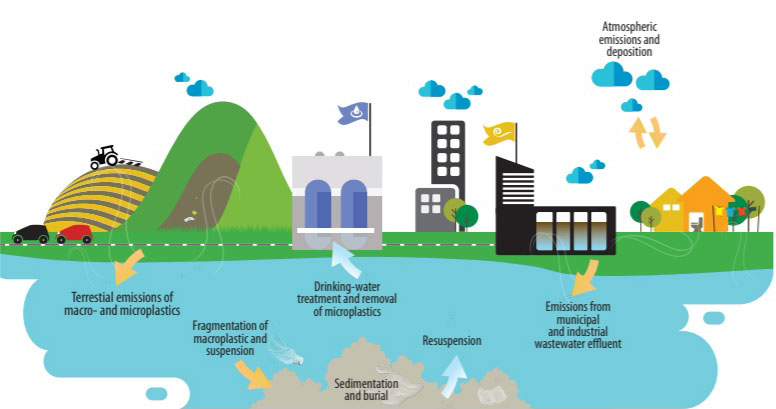A new analysis from the World Health Organisation plays down fears over microplastics in water but says further research still needed…
'Optimised water treatment’ effective to remove microplastics
The global water industry can breathe a temporary collective sigh of relief over microplastics, for now at least.
“Optimised” drinking water and wastewater treatment systems are considered “highly effective” in removing microplastics, according to the latest analysis from the World Health Organisation (WHO).

Wastewater treatment can effectively remove more than 90 per cent of microplastics, with the highest removals from tertiary treatment, such as filtration, WHO said.
Meanwhile, conventional drinking-water treatment can remove particles smaller than a micrometre.
The challenge continues to lie where such “optimised” treatment does not exist: the significant proportion of the global population currently not benefitting from adequate water and sewage treatment.
Furthermore, routine monitoring of microplastics in drinking-water is not recommended at this time, as there is no evidence to indicate a human health concern.
WHO said microplastics larger than 150 micrometres "are not likely to be absorbed in the human body and uptake of smaller particles is expected to be limited".
However, the organisation called for further assessment of microplastics in the environment and specifically, their potential impacts on human health.
More microplastics data needed
The analysis summarises the latest knowledge of microplastics in drinking water. It is WHO’s “first effort to examine the potential human health risks associated with exposure to microplastics in the environment”.
"We urgently need to know more about the health impact of microplastics because they are everywhere - including in our drinking water," said Dr Maria Neira, director of the Department of Public Health, Environment and Social Determinants of Health, at WHO.
“Based on the limited information we have, microplastics in drinking water don’t appear to pose a health risk at current levels. But we need to find out more. We also need to stop the rise in plastic pollution worldwide.”
WHO called further research and the following measures:
- Developing standard methods for measuring microplastic particles in water;
- More studies on the sources and occurrence of microplastics in freshwater; and the efficacy of different treatment processes.
WHO recommends drinking-water suppliers and regulators prioritise removing microbial pathogens and chemicals that are known risks to human health, such as those causing deadly diarrhoeal diseases.
This has a double advantage: wastewater and drinking-water treatment systems that treat faecal content and chemicals are also effective in removing microplastics.
Recommended action for water suppliers and drinking-water regulators
Water suppliers and regulators have been urged to continue to "prioritise the removal of microorganisms and chemicals in drinking-water that pose a public health concern”.
Routine monitoring of microplastics in drinking-water is not recommended at this time, WHO said, as there is no evidence to indicate a human health concern.
As part of water safety planning, water suppliers should ensure that control measures are effective and should optimise water treatment processes for particle removal and microbial safety, which will incidentally improve the removal of microplastic particles.
Routine monitoring of microplastics in drinking-water is not recommended at this time, as there is no evidence to indicate a human health concern.
The full report – Microplastics in drinking water – can be downloaded here.







